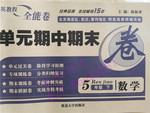题目内容
Have you seen Jack recently?I wonder ________with his classmates.
A.how is he getting along
B.that he is getting along well
C.what he is getting along
D.if he is getting along well
练习册系列答案
 单元期中期末卷系列答案
单元期中期末卷系列答案
相关题目
题目内容
Have you seen Jack recently?I wonder ________with his classmates.
A.how is he getting along
B.that he is getting along well
C.what he is getting along
D.if he is getting along well
 单元期中期末卷系列答案
单元期中期末卷系列答案